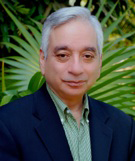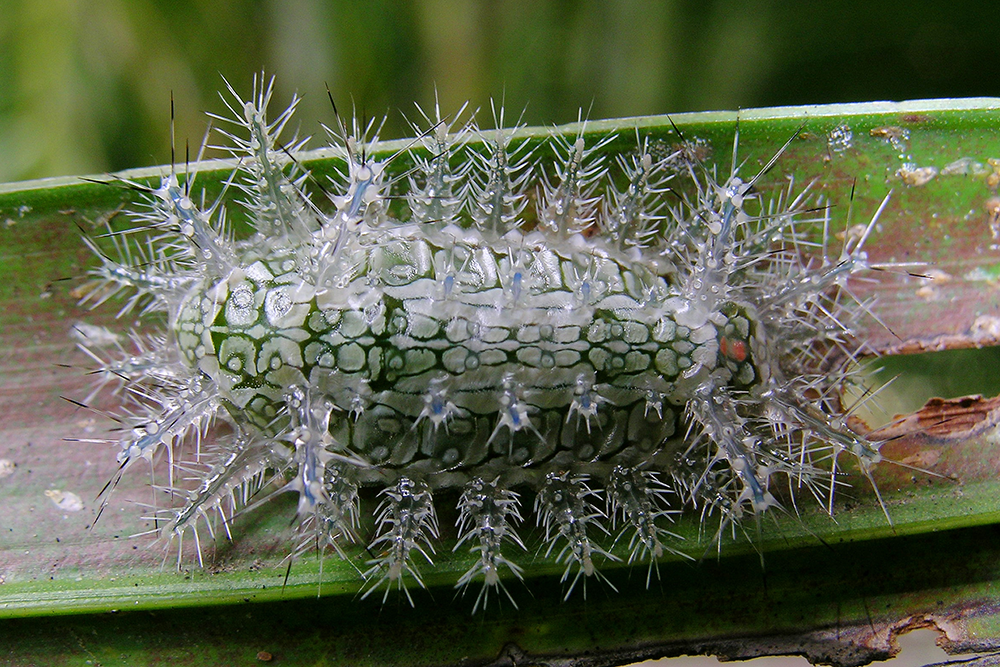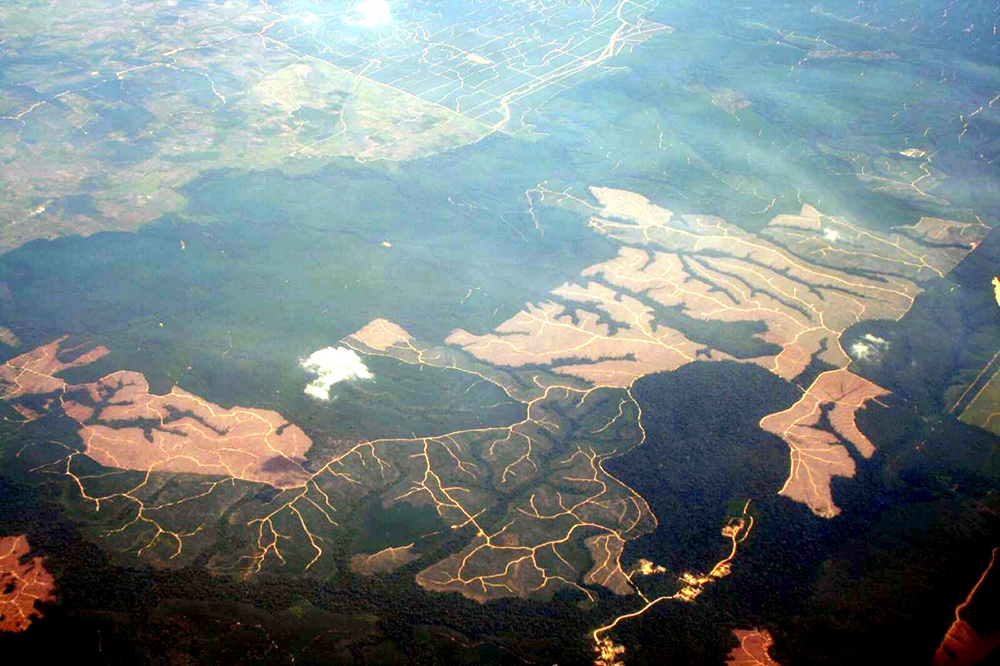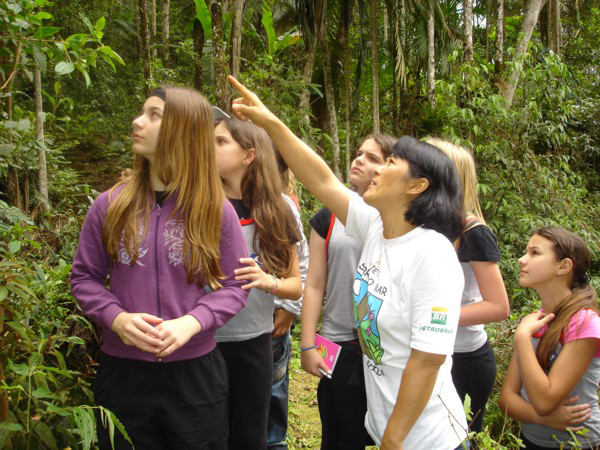MIDORI Prize—Acknowledging Excellence in Biodiversity Contributions
Air Date: Week of September 19, 2014
View through the rainforest in Borneo. Dr. Kamal Bawa edited a scholarly article published this July assessing the country’s tropical rainforests.
The 2014 MIDORI Prize, a prestigious award for contributions to conservation and sustainable use of biodiversity was won by, among others, Kamal Bawa, a professor at University of Massachusetts at Boston. Host Steve Curwood discusses the prize, Dr. Bawa's tropical rainforest research and the state of biodiversity in India, the U.S., and the globe.
Transcript
CURWOOD: Species are disappearing at a rate unprecedented in recent times - a crisis that’s so severe some call it the sixth mass extinction. But there are heroes in our time working to preserve vital ecosystems, and to recognize these people, there’s the MIDORI Prize for Biodiversity. Every two years, the UN Convention on Biological Diversity chooses honorees to receive a wooden plaque and $100,000 U.S. dollars to support their work. The winners of the 2014 prize range from a Venezuelan expert in llamas, alpacas, and vicuñas, to a Ghanaian leader of the international dialogue on biodiversity, and a champion of conservation in India, Dr. Kamal Bawa. Dr. Bawa is also Distinguished Professor of Biology at the University of Massachusetts at Boston, and he came into our studio. Welcome to the program.
BAWA: Thank you.
CURWOOD: So, congratulations, professor!
BAWA: Thank you.
CURWOOD: So you get a wooden plaque and $100,000 dollars. You're going to give away the plaque and keep the $100,000 dollars, I imagine. [LAUGHS]
BAWA: [LAUGHS] Well, already, a number of claims have been filed against the $100,000 dollars: There is family; there is this environmental think tank that I established in India. Two years ago, I had won a larger prize that is $170,000 and I had given it all to Ashoka Trust for Research in Ecology and the Environment- a mouthful but the acronym is ATREE. So, I suspect in this case, too, much of the money would go to ATREE.

Dr. Bawa is a Distinguished Professor of Biology at the University of Massachusetts, Boston, and President of ATREE in Bangalore, India. (Photo: Courtesy of Dr. Kamal Bawa)
CURWOOD: So ATREE, I gather, trees are a special passion of yours. Why are trees so important?
BAWA: Trees are actually the main element of the major biological communities we find on Earth, and that's forests. I started working in Central American forests, primarily in Costa Rica. I was interested in these rainforests, in terms of trees, how do they reproduce? As we know, tropical rainforests are full of a large number of species. Two-thirds of all plant and animal species occur in the tropics, so when you have a very large number of species, individuals of a given species are scattered in the forest—two individuals of the same species maybe as far as one kilometer. So the question is, how are they reproducing? From where do they get pollen? Are they cross-pollinating or are they self-pollinating? And I was interested in those mechanisms, and I discovered actually that trees are cross-pollinated. There's no problem in having the pollen move from one tree to another tree even though they might be far apart by a wide variety of pollinators: bats, birds, bees.
CURWOOD: So in other words, trees can date another tree across town.
BAWA: Absolutely. Yes, and they're very good at that. [LAUGHS]

Costa Rica, where Dr. Bawa researched the reproduction of trees in tropical rainforests, is home to an astoundingly diverse array of organisms. (Photo: bayucca; Flickr CC BY-NC-SA 2.0)
CURWOOD: [LAUGHS] You focus primarily on whole ecosystems. Why?
BAWA: Working with trees, I was not particular interested in any given species of trees. I was working in the whole community. At that time there was a realization that there’s these biological interactions that are very critical in giving communities an entity that is larger than sum of its parts. Many of us also saw a very large-scale destruction of forests, and we started to wonder about the conservation of forests. Conservation is a sort of a social, economic, and political issue. It was a challenge at that time; it remains a challenge now.
CURWOOD: So how are we doing in this battle to save biological diversity on the planet? Winning? Losing? Holding our own?
BAWA: I think we're holding our own. I think there might be some improvement in some places. In other places there might be decline. We can't generalize at the global level. For example, in Brazil, the rates of deforestation have come down very significantly, but then there are other places, some places in Africa, where the rates of deforestation has gone up. Some people believe that as there is economic growth, people are better off, and we probably have better chances of conserving biodiversity.

Deforestation threatens the biological diversity found in tropical rainforests. (Photo: Wakx; Flickr CC BY-NC-SA 2.0)
CURWOOD: How optimistic are you about the biodiversity in India at this point, protecting it?
BAWA: I tell people I have to be optimistic; otherwise if I get up and I'm not optimistic I don't have any work to do. But seriously, I am optimistic. I think India is unique, despite the fact that it's a nation of almost 1.2 billion people, most of those people are very poor, has managed to conserve a very substantial amount of biodiversity. India has protected areas that account for about 150,000 square kilometers, and some would like to see that area doubled. And there's still a very large amount of biodiversity, which is of global significance.
CURWOOD: Before you go, can you give us some advice here please in United States about what you see as some top priorities for us to protect our biological diversity?
BAWA: I think we have to have a very comprehensive and interdisciplinary approach. We have to make sure that we are reaching the younger generation and civil society as a whole. I think we have to make certain that there is good exposure to the environment, to outdoors, and we have to reach people at a very young age. And just like in other parts of the world, we have to be very good in consensus making. And fortunately, I think our long history of democracy and democratic processes would allow us to do that.

Dr. Bawa calls for early exposure to the natural environment as one way to preserve biological diversity. (Photo: Gwoehl; Wikimedia Commons)
CURWOOD: So how well are we doing as Americans in meeting those opportunities?
BAWA: I think our record is good in some respects and in other respects it's not good. I think our policies are very well crafted, and I think in many cases we are doing a number of things at the local level, at the state level, I think issues like climate change, I think people are looking at the US to be a leader. And when people hear that there are many people who don't believe in climate change issues at the very highest levels of government, that doesn't help us.
CURWOOD: Kamal Bawa is one of the 2014 Midori prizewinners. He's a Professor at the University of Massachusetts in Boston and President of ATREE in Bangalore, India. Thanks so much for taking the time today.
BAWA: Thank you.
Links
Discover more about the MIDORI Prize for Biodiversity and this year’s recipients
Living on Earth wants to hear from you!
Living on Earth
62 Calef Highway, Suite 212
Lee, NH 03861
Telephone: 617-287-4121
E-mail: comments@loe.org
Newsletter [Click here]
Donate to Living on Earth!
Living on Earth is an independent media program and relies entirely on contributions from listeners and institutions supporting public service. Please donate now to preserve an independent environmental voice.
NewsletterLiving on Earth offers a weekly delivery of the show's rundown to your mailbox. Sign up for our newsletter today!
 Sailors For The Sea: Be the change you want to sea.
Sailors For The Sea: Be the change you want to sea.
 The Grantham Foundation for the Protection of the Environment: Committed to protecting and improving the health of the global environment.
The Grantham Foundation for the Protection of the Environment: Committed to protecting and improving the health of the global environment.
 Contribute to Living on Earth and receive, as our gift to you, an archival print of one of Mark Seth Lender's extraordinary wildlife photographs. Follow the link to see Mark's current collection of photographs.
Contribute to Living on Earth and receive, as our gift to you, an archival print of one of Mark Seth Lender's extraordinary wildlife photographs. Follow the link to see Mark's current collection of photographs.
 Buy a signed copy of Mark Seth Lender's book Smeagull the Seagull & support Living on Earth
Buy a signed copy of Mark Seth Lender's book Smeagull the Seagull & support Living on Earth

